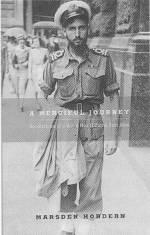- Author
- Francis, Richard
- Subjects
- Biographies and personal histories, History - WW1, Book reviews, Biographies
- Tags
-
- RAN Ships
- None noted.
- Publication
- December 2005 edition of the Naval Historical Review (all rights reserved)
Merciful Journey – Recollections of a World War II Patrol Boat Man – by Marsden Hordern – The Miegunyah Press – imprint of Melbourne University Publishing Ltd., 2005.

The distinguished author has been a long-serving member of the Naval Historical Society and a stout contributor to the REVIEW, so it is indeed fitting to review his latest book in these pages. This is an account of his unflinching service in the equivalent of small patrol craft during WW2 and which at war’s end found him in command of an HDML on the front line in New Guinea, disarming troops of a still large (100,000) and defiant Japanese Army. It says a great deal of the tolerance and humanity shown the sick and wounded by Australian servicemen to a brutal and skilful, aggressive enemy. The desperate search for Allied POWs was another priority, as the real danger of their ultimate execution by the Japanese Army to eliminate evidence of their own general inhumanity was a great concern.
Marsden Hordern may have found himself at the sharp end of the wartime RANVR through the initial influence of his mother and the subsequent nurturing of his older and wiser shipmates, but it is evident that his naval training and acceptance of the risks and challenges encountered subsequently proved his mettle. We can be thankful that his regular letters home and to friends of a lifetime have been preserved to provide this factual story of young Australian men serving afloat in often acute hardship, particularly hunger and hygiene. Along the way he contributes his own reflections on the great navigators and explorers of this vast continent as he passed by their heritage detailed on his charts and sailing directions, and his books have this consistent theme of drawing out comparisons of his own navigation and the experiences of these earlier renowned seafarers.
The book is well illustrated with original photographs to accompany the text and maps to allow the reader to follow his tracks. The pictures of the author may reflect a youthful and inexperienced young officer, but his cheerfulness and good companionship have made this a happy story, well worth the telling, and his later scholarship has embellished it with useful footnotes and illuminating asides, to round out his personal experiences. From my own experiences in small craft, in a similar environment in the Malaysian Confrontation up the Borneo rivers twenty years later, I can feel a professional bond with his minor war vessel and its miniscule crew, who served their country admirably under invariably difficult circumstances.
The final chapter’s observations on the rapid demobilisation of such vessels in the RAN is a classic understatement of the enormity of the end-of-war task. However, one such HDML survived for many years as a tender to the training establishment, HMAS LEEUWIN, (as recently as 1990s) and some of her relics are preserved ashore in museums and cadet units. Small wonder that such useful craft are often dismissed as mere boats, except by that small number of accomplished naval surveyors and hydrographers who similarly share these privations in their daily work.




